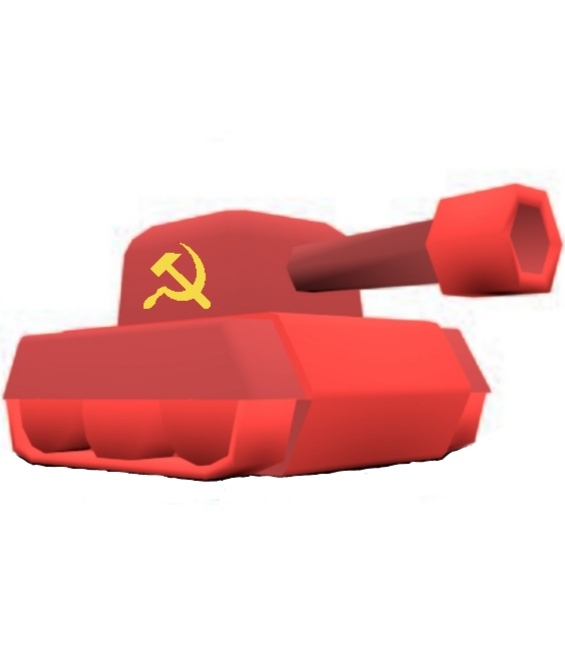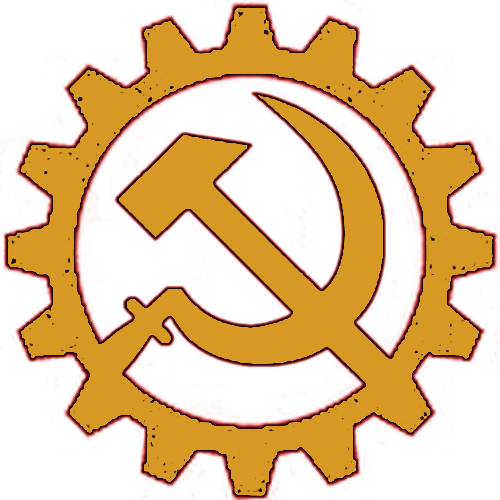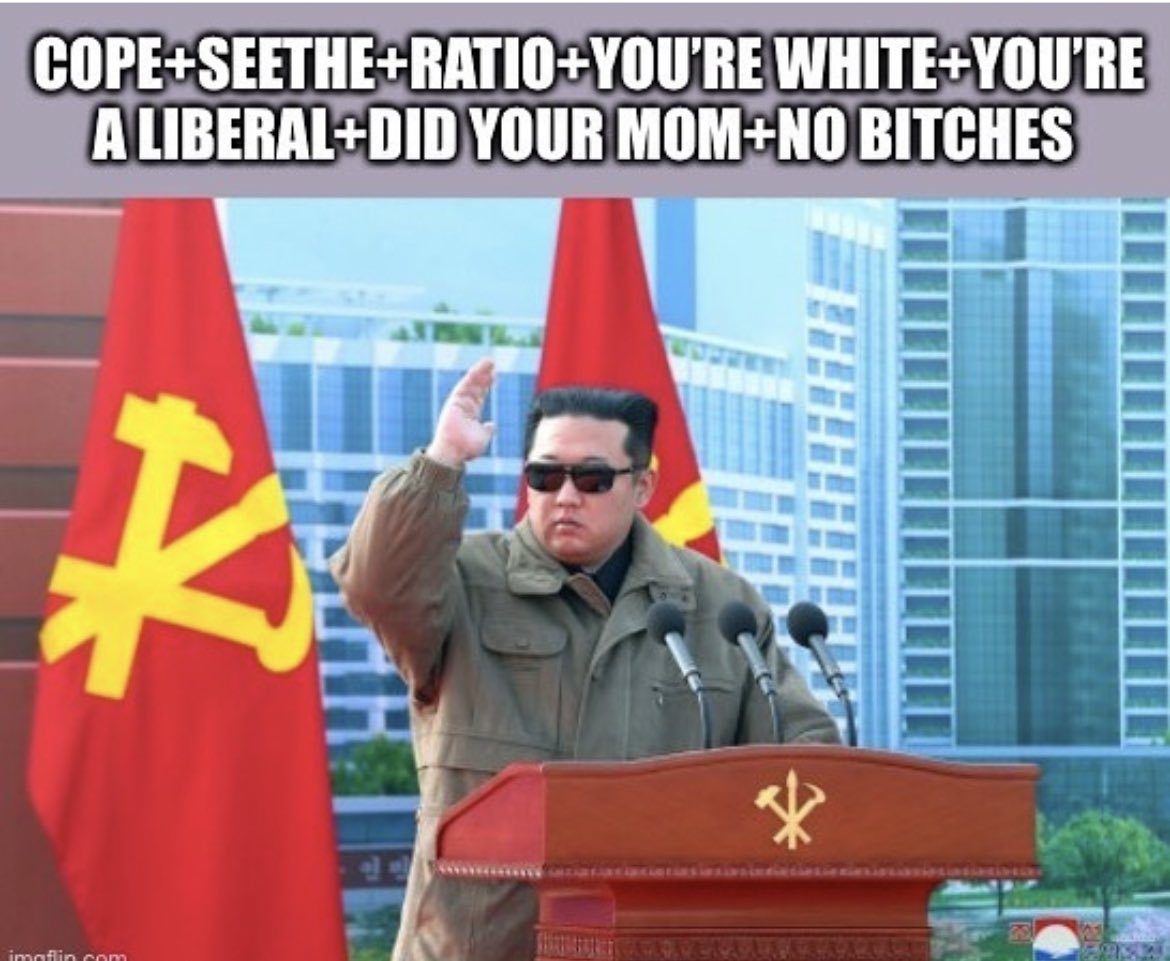Since when is Russian economy "centrally planned"? Do we have a different definition of it?
My understanding is that state owned enterprise has become very dominant in Russia after the start of the war, and a lot of private business is now being state directed. So, I think it's fair to say that the commanding heights of the economy are largely under state control now.
That's not based on the article is it? The article seems to attribute growth primarily to the war economy.
The war industry isn't actually that big of the overall percentage of the overall economy. Western publications tend to focus on the war industry as the explanation, but the reality is that western decoupling opened up a lot of economic niches that are now being filled domestically.
state owned enterprise has become very dominant in Russia after the start of the war
Kind of what he said?
Yeah, I read the comment. The thesis of the title isn't supported by the article, which makes for a confusing read.
if France gets a GDP boost by cranking their military budget into their state arms companies i don't think anybody would call that central planning. has Russia really reorganized their economy?
During the first world war imperialist countries used a centrally planned economy, while still remaining bourgeois dictatorships.
This is not a dunk on capitalism, only yet another proof that "free market" is objectively utter bullshit because even capitalists know
is russia a centrally planned, mobilized economy right now? this isn't rhetorical
I don't have enough knowledge to answer, I'm just saying that it's not unrealistic when looking back at History
Military spending is still a small part of overall GDP in Russia, so the claim that Russian economy is recovering due to cranking up of their military budget doesn't make sense. A far more sound explanation is that decoupling from the west created economic niches that are now being filled domestically. And I think it is fair to say that Russian economy has been reorganized in the past two years with state owned enterprise such as Rostec taking a much more prominent role.
Rostec is a military manufacturer! further, what you're describing isn't supported by the article and doesn't really sound like central planning. when Pemex has a good year Mexico is not any less neoliberal
I'm not going by just the article itself. Details of Russian economy are well documented.
Rostec is also a lot more than just a military manufacturer. Meanwhile, there have been plenty of articles over the past two years that explain how Russia is reverting back from liberal policies and putting the state in commanding heights of the economy.
A 2023 World Bank study gives a pretty good overview. In particular, it distinguishes between businesses of the state (BOS), that are at least 10% government owned by some government, and state owned enterprises (SOE), which are majority owned or more, and controlled, by the government.
Top line result is shown in the following chart:
Show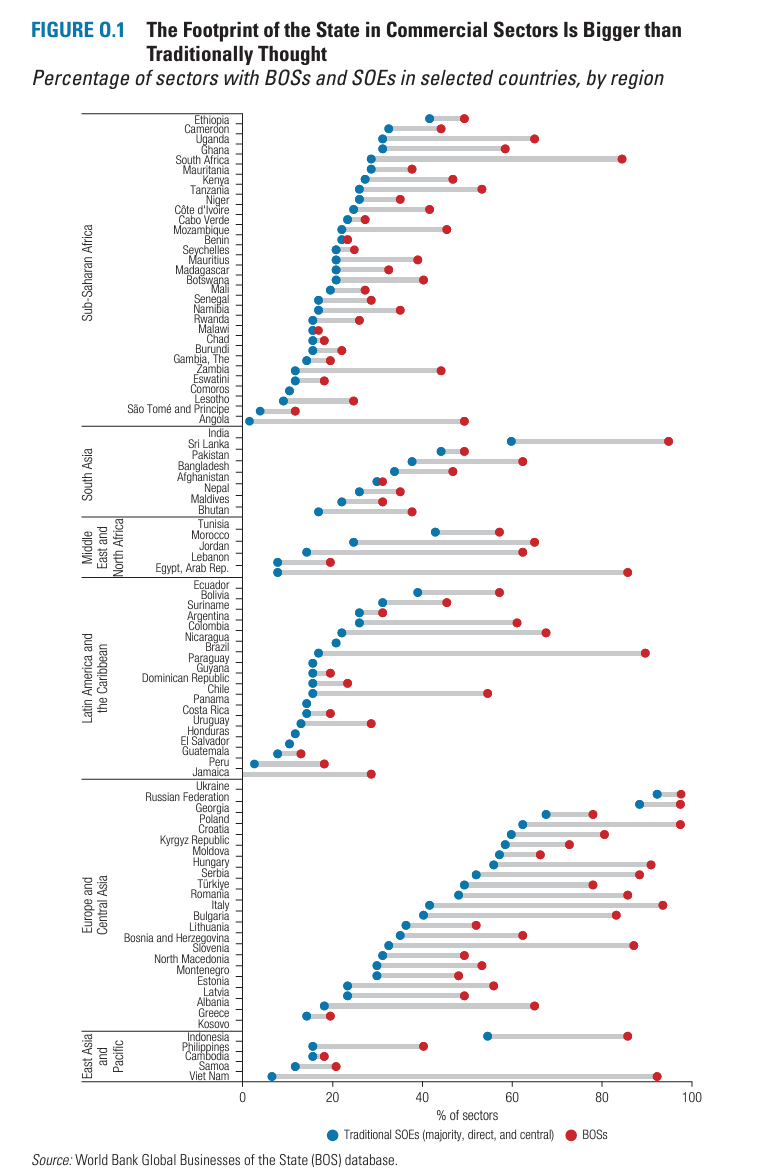
And here's another chart showing SOE in Russia compared with China https://cepr.org/voxeu/columns/state-owned-enterprises-global-economy-reason-concern
Show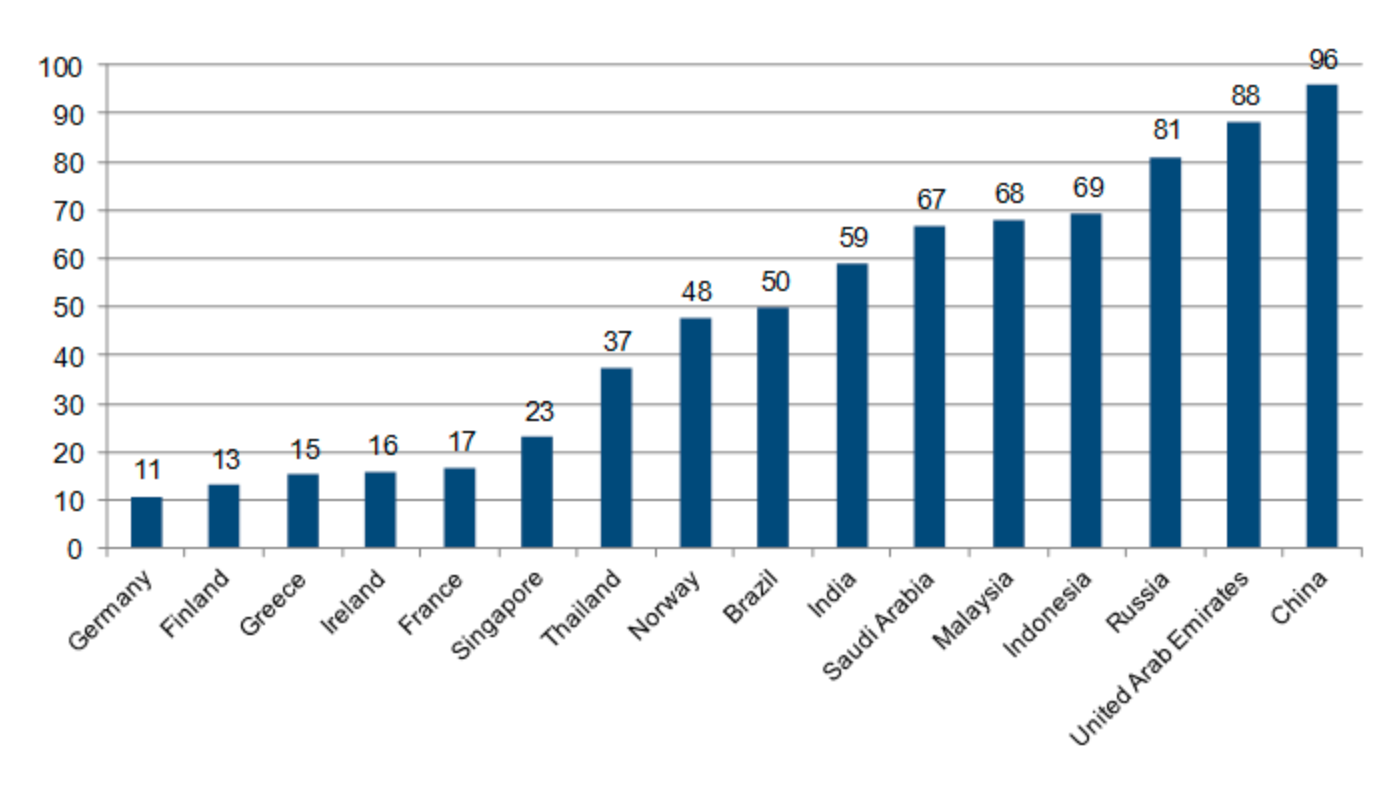
Russia's high levels of SOEs is not far behind China by many measures.
Central bank plays a big role in Russia as well, and has large influence over the funding of the private enterprise. FT even moaned about state directed economy standing up to sanctions back in 2022.
Finally, here's an article talking deprivatization of Russian economy.
Funny seeing the UAE up there. Just following the implications logically there it's easy to reconstruct the class character of the state.
Probably in no means comparable to that of the Soviet Union, but the damage done to the oligarchs' wealth and influence (who no one liked anyways for obvious reasons, who had been a serious hurdle for the Russian state to deal with, and who had ironically been pretty pro-western or west-compromised) is something incredibly positive to consider- as is the exodus of western corporations, leaving their assets to be bought up on the cheap and their roles to be filled by local or Chinese brands, and the newfound push back to self-sufficiency in many fields.
Any one of these three aspects alone would be more than enough to call it a serious reorganizing (though not one remotely as drastic as returning to communism, sadly), economically, and politically.
Russia is probably not returning to communism anytime soon, but it's headed in incredibly decent places if you ask me (other than the issues of conservative politics, but they're not headed into fascism either unlike much of the west, and they remain non-imperialist). And if you ask me- it's not the best case scenario, sure, but it's an exceedingly good thing for Russia and the wider world.
Looks like the US is remaking the Soviet Union. Thought that's what Putin was supposed to be doing.
Capitalism has winners and losers and the winners don't like competition. This leads to monopoly. The real questions is if the monopoly meets the needs of the people and have a way for the people to fight those in power with the excesses.
Every stable economies are Keynesian
Every failed economies are called Free Market
You are either ignorant of history or you have a different definition of what constitutes failure than normal people. State directed economies have been objectively the most successful model in human history for rapidly and as widely as possible improving material conditions.
What has failed in the past and continues to fail is actually the liberal economic model.
Which command economies are providing increases in material conditions right now?
China, Cuba, Vietnam, Venezuela, Belarus, DPRK, and if it is true that Russia is switching to a more state driven model then you can count Russia too because they are seeing a lot of growth with even more forecasted to come.
Meanwhile most of Europe is in recession, the US only has fake financialized growth, while the countries in the global south where the neoliberal model has been imposed are utter failures, just look at the disaster in Argentina.
You seem confused as to what the terms we are using actually mean since you speak of "command economies" rather than state led economies. State led does not mean absence of a market and it does not imply total economic planning. It means that the commanding heights of the economy are in the hands of the state which steers the overall direction of the economy. It does not have to look exactly like the USSR did, though that was a very successful model that was fit for the purpose of turning a backwards agrarian society into a modern industrial superpower.
And by the way, many of the advanced capitalist economies also got to where they are because in the past they employed state driven models of economic development as well as heavy protectionism. This is particularly true for Japan and occupied ("South") Korea, but also for European countries like Germany (the latter just did it earlier).
The Pax Americana often rely on redefinition of words through education system, 'educational' article, and media to manipulate their citizens so most people in Western European diaspora often do not know about the definition of Socialism, Capitalism, 'state', 'dictatorship', or centralized economy. To them, Socialism and Capitalism simply refers to the amount of government intervention or the level of absolutism even when the labeling practice by Pax Americana of real life economic system is more consistent with the original distinction of the economic class in power than with the level of authoritarianism. This is why Venezuela under Socialist president Maduro could implement a highly competitive free market economy where uneducated elderly people with no funding could start a successful enterprise despite the current series of recessions that Pax Americana planned while a recession in Pax Americana would cause failure of small enterprises, barricade the start of new entrepreneurship, stop market competition, and increase wealth gap that allow the rich 1% to get richer during the recession.
Belarus doesn't have a centrally planned economy, it uses more of a classic Keynesian approach.
I don't know if i'd describe it as "Keynesian" but yes you are right, it's not "centrally planned" in the traditional sense. Most of the countries i mentioned do not have centrally planned economies. This is not about central planning, it's about state driven vs liberal "free market" models. Economic planning is just one tool that a state can employ to guide and shape its economy. The key distinction here is about who ultimately has the power. Does the state control capital or does capital control the state?
That's a good point. And yet in western liberal democracies the bourgeois state has become increasingly unwilling or incapable of bringing the rest of the capitalist class to heel. Even traditionally social democratic Europe is becoming more and more neoliberal, while at the same time states in the global south that are trying to assert their independence from western neo-colonialism, as well as semi-peripheral states like Russia find themselves going in the opposite direction and rejecting neoliberalism in favor of a more state led model, if only for the purely pragmatic reason that they are finding that neoliberalism is not just a hindrance to their development but is actively anti-development. The western states that have embraced it have been de-industrializing and de-developing before our eyes.
And the fact that this phenomenon is happening in both bourgeois states like Russia and in proletarian ones like the AES states which had opened up and liberalized to a degree in the 80s and 90s illustrates a point that Marxist-Leninists who support China have been making for a while now: that socialism is not synonymous with economic planning nor capitalism with markets, but that these are merely economic tools that both proletarian and bourgeois states can use. At the end of the day, as you correctly point out, the real determinant of socialism vs capitalism is which class controls the state. And so far Russia is still very clearly a dictatorship of the bourgeoisie.
So yes, to sum up, you are right, however there is still something interesting happening in terms of the economic model that we are seeing have success and the one which is not.
The bourgeoisie are not a unified monolith. There are sharp contradictions between finance capital and industrial capital. Finance capital's extreme parasitism, self-destructiveness and tendency toward de-development poses a threat to industrial capital and creates inter-capitalist conflict. So i suppose it would be more accurate to say that finance capital does not control the state in state led economies.
That’s the conclusion that follows from the arguments, but it doesn’t make much sense. State led doesn’t care about the profitability much, they want stuff done in accordance with the goals of the state. The “finance capitalists” of today don’t finance much because not much is profitable today. The finance sector needs the state to prop it up, that’s what neoliberalism does. The capital is concentrated there so the capitalist state props it up. Finance capital is the condition for imperialism and thus has the state that supports it help it by using the military and foreign policy to open markets for export and exploitation. @cfgaussian@lemmygrad.ml what do you think?
I think your analysis of the role of finance capital in imperialism is correct.
State led doesn’t care about the profitability much, they want stuff done in accordance with the goals of the state.
This part i don't fully agree with. We cannot speak of "the state" in the abstract as the state is an instrument of class rule. And if we are talking about a bourgeois state then the "goals of the state" are the goals of the bourgeoisie, and more specifically the section of that class whose interests it represents. Which means that they do care about profitability, but whose profitability? To answer this question we again have to analyze the precise class character of the state in question...national bourgeois, comprador, finance imperialist, etc.
The problem is that the logic of capitalism eventually dictates that even if you do have a bourgeois state that for the time being serves first and foremost the interests of industrial capital, the natural progression of capitalism toward a falling rate of profit compels the system toward financialization and imperialism in order to maintain profitability. And that is if it actually manages to retain its independence and not become subjugated by a foreign imperialist power thereby turning comprador.
I agree with this assessment. My point was that with a rational nationalist country like Russia their ultimate goal may be to defend the bourgeoisie, but they aren’t trying to make the war machine more profitable. The defense industry for a pre-imperialist country matters more if it is able to defend them than if it is going to be a staple of the economy. Meanwhile in China they dgaf about companies’ profits, they just want to improve people’s lives and so on. As long as they are involved in the world market this means making “win win” deals that do increase people’s profits. However, since that is not their goal, they’re willing to attack industrial capital if it’s not doing its job, like the real estate thing.
I think i generally agree with that take. One small correction though:
to attack industrial capital [...] like the real estate thing
I don't think real estate counts as industrial capital, from my understanding it falls under the FIRE (finance, insurance, real estate) category of parasitic capital.
No, i mean the people building houses stupidly by taking out loans and paying them off with construction that would be delayed.
I don’t really know which side I fall on exactly, but here’s a debate I was involved in over this about whether that understanding is correct: https://lemmygrad.ml/post/2656976 https://lemmygrad.ml/post/2680725
What matters is if capital controls the government. The state can manage the economy in the interests of the capitalists or the workers. It can manage it to a greater or lesser extent. State run companies would make it a greater extent, but its socialist or capitalist character is in who controls the government and where the surplus goes.
DPRK
OK, now I know you're not serious. Also, what about people who don't want to live under dictators? This is a joke, it has to be.
We're talking economics here, what is unserious is resorting to infantile accusations of dictatorship, which as we know is a political cudgel used against anyone who does not conform to the liberal model. When looking at the objective data it confirms what i have said, especially about the DPRK. Its productive capabilities have managed to develop impressively despite crushing sanctions, it is one of the most industrially potent countries in the world in its "weight class". It is no coincidence that it has managed to achieve not only self-sufficiency but also has enough industrial surplus to produce advanced weapons systems which guarantee deterrence against hostile powers, as well as large enough quantities of munitions that even Russia - itself a huge producer - is receiving imports from the DPRK.
shockingly @Neato@ttrpg.network does not reply when they would be forced to respond directly
you're scum bucko! Credulous scum
The world is bigger than you can even imagine. Please go read some books; start here.
You live under a dictatorship of the bourgeoisie. In the US, this dictatorship allowed over a million people to die of a pandemic to keep short-term profits up.
Quick question, call it a reality check: who is winning the war in Ukraine?
China, obviously for one. Also Russia according to the article.
You're right. They will never convince the west to shed their liberal brainworms.
Failure is when your economy gets better. In the past, failure is when you go from a feudal backwater to a spacefaring superpower in the span of a single human lifetime. If only they could be economically successful, like Britain or America.
I mean, if everything else has failed, you might as well check any other alternatives you've relied upon...





